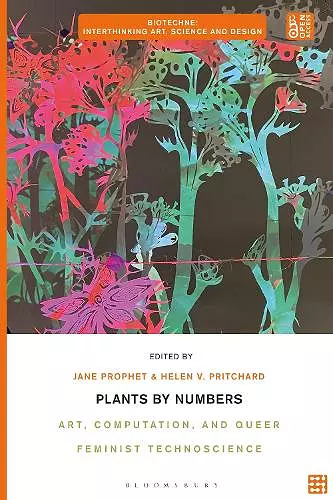Plants by Numbers
Art, Computation, and Queer Feminist Technoscience
Dr Jane Prophet editor Dr Helen V Pritchard editor
Format:Hardback
Publisher:Bloomsbury Publishing PLC
Published:16th Nov '23
£90.00
Supplier delay - available to order, but may take longer than usual.

This book innovatively examines the unfolding relationships between humans and their non-human neighbours through the perspective of feminist queer theory and visual art, tackling questions related to technological and ecological change simultaneously.
This open access book takes a queer, feminist, and decolonial technoscience approach to the ecologies that emerge from our entanglements with nonhumans (air, rocks, algae, trees, soil and plants) and computational hard/software. In Plants by Numbers, artists and theorists working with computation address the urgent need to think beyond the human paradigm, opening up new fields of debate that question the troubled relationship between ecosystems and human technology.
Organised around three key themes--techno-nature entanglements, plants as resistant agents, and becoming-with-plants--the volume provides a vital pathway through complex theoretical ideas that inform the practices of artists working in the fields of computation and ecology.
Fusing art theoretical and art practice approaches, the contributors describe how we might design, make and imagine computational processes differently, or otherwise, through the co-production of artworks with plants. Showing how these artworks might act as communicative media between the biological and technological, Plants by Numbers opens up new potential areas of research whilst producing new ethical-political engagements.
The eBook editions of this book are available open access under a CC BY 4.0 licence on bloomsburycollections.com. Open access was funded by the University of Michigan.
A text that demonstrates the vital importance of observing and treating plants as our companion species, and as cohabitants of this planet to bend towards and learn from, as we ponder our own significance and survival, threatening the end of the anthropocene. * Legacy Russell, Executive Director and Chief Curator of The Kitchen, author of Glitch Feminism (2020) *
Plants by Numbers works through how coloniality shapes, but does not absolutely envelop, our queerly inter-human and inter-ecological worlds. Rethinking classificatory taxonomies, the book centres plant-life and its aesthetic-scientific possibilities in an eloquent intervention into studies of livingness, affect, and relationality. * Katherine McKittrick, Professor and Canada Research Chair in Black Studies, Queen’s University, Canada; Author of Dear Science and Other Stories (2021) *
This timely collection of accounts by artists, curators, technoscientists and theorists speculates on different modes of world-making and creating kinship with plants, establishing a rich ground for more-than human entanglements. * Petra Löffler, Professor of Contemporary Media Theory and History, Carl von Ossietzky University Oldenburg, Germany *
Growing from a simple prompt, to consider numbering-otherwise, this volume brings together artistic, academic and community-building studies and productions of co-constitutive life worlds of plants and soil, computation and simulation, humans and more-than-humans.
Rooted in anti-colonial, Black and Indigenous, trans-feminist and queer science and technology studies and poetics, shifting away from numbering as a method of control, and generously reimagining accounts, plots and digging as critical cultivating methods and creative practices, Plants By Numbers is essential reading (and experiencing) for artists, scholars, organizers, gardeners, farmers, teachers, observers, dreamers and anyone moved by the transformational and technocultural worlding of entangled plant lives.
In our data-driven world, this collection asks how we might articulate an ethico-politics of numbers with respect to the more-than-human world. Respect is key here, for the power of enumeration but also for its limits, and for the irreducible relationality of sustainable world-making. * Lucy Suchman, Professor Emerita, Anthropology of Science and Technology, Lancaster University, UK *
ISBN: 9781350343252
Dimensions: 236mm x 162mm x 22mm
Weight: 800g
288 pages